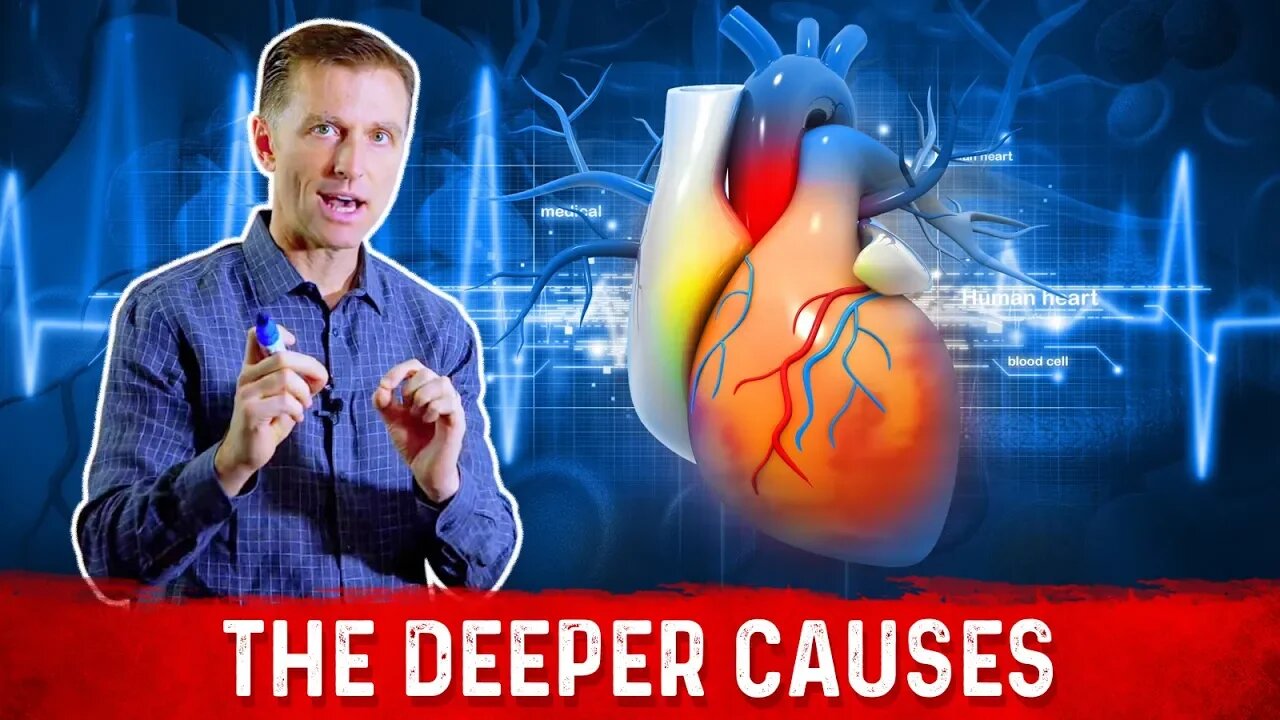Premium Only Content

The 7 Causes of Arrhythmias – Dr.Berg
I explain the 7 causes of arrhythmia.
Timestamps:
0:00 The 7 causes of arrhythmia (and what you can do about it)
0:51 Your heart’s pacemaker is under the control of the vagus nerve
2:05 These are the 7 things that cause arrhythmia
4:30 Here’s how to restore your electrolytes
Arrhythmia involves the electrical system of your heart. It’s no longer in a regular rhythm. Your heart will stop, speed up, or pound, resulting in symptoms such as feeling dizzy, sweating, and chest pain. One of the problems is that there is hardly any emphasis on the person’s diet. Usually, a medical provider talks about risk factors then go straight to treatment.
The heart’s electrical system depends on electrolytes, electrically charged minerals that allow your muscles to contract and relax and the nerves to transmit communications throughout your nervous system.
Your heart’s pacemaker is under control of the vagus nerves which connect your brain and various organs including your heart. It’s part of the autonomic nervous system, which is parasympathetic rather than sympathetic.
The autonomic nervous system really needs vitamin B1. Refined carbohydrates can create a B1 deficiency. So too can stress, various stimulants such as drinking too much coffee, or various drugs.
These are the 7 things that cause arrhythmia:
1. Hypothyroidism
2. Hyperglycemia; in other words, diabetes or insulin resistance (which will block electrolyte absorption)
3. Alkalosis coming from low potassium or high cortisol; your blood is slightly too alkaline. You may also have low stomach acid as indicated by heartburn and GERD.
4. Hypokalemia; low potassium, usually from a high carb diet or perhaps being on a diuretic
5. Hyponatremia; a sodium deficiency usually from a low salt diet and drinking a lot of water
6. Hypocalcemia; low calcium (too much calcium can also be an issue), which can be caused by low vitamin D
7. Hypomagnesemia; low magnesium, another electrolyte
If you’ve had a gastric bypass you’re at risk of arrhythmia because of malabsorption of certain electrolytes. Malabsorption can also be caused by IBS, celiac disease, scar tissue in the colon, or a history of taking antibiotics. If you have damage in your colon you’ll have a hard time absorbing electrolytes which could then lead to arrhythmia.
How to restore your electrolytes:
●Consume 7-10 cups of veggies per day
●Acidify your body; take betaine hydrochloride
●Avoid refined carbs
●Fix insulin resistance
●Raise your vitamin B1 levels
Taking these steps will help with your arrhythmia.
Talk to a Product Advisor to find the best product for you!
Call 1-540-299-1556 with your questions about Dr. Berg's products. Product Advisors are available Monday through Friday 8am-6pm and Saturday 9am-5pm EST.
* At this time, we no longer offer Keto Consulting and our Product Advisors will only be advising on which product is best for you and advise on how to take them.
Dr. Eric Berg DC Bio:
Dr. Berg, age 56, is a chiropractor who specializes in Healthy Ketosis & Intermittent Fasting. He is the author of the best-selling book The Healthy Keto Plan, and is the Director of Dr. Berg Nutritionals. He no longer practices, but focuses on health education through social media.
Follow Me On Social Media:
Facebook: https://bit.ly/FB-DrBerg
Instagram: https://bit.ly/IG-DrBerg
Anchor: https://bit.ly/Anchor-DrBerg
TikTok: https://bit.ly/TikTok-DrBerg
Send a Message to his team: https://m.me/DrEricBerg
ABOUT DR. BERG: https://www.drberg.com/dr-eric-berg/bio
Disclaimer:
Dr. Eric Berg received his Doctor of Chiropractic degree from Palmer College of Chiropractic in 1988. His use of “doctor” or “Dr.” in relation to himself solely refers to that degree. Dr. Berg is a licensed chiropractor in Virginia, California, and Louisiana, but he no longer practices chiropractic in any state and does not see patients so he can focus on educating people as a full time activity, yet he maintains an active license. This video is for general informational purposes only. It should not be used to self-diagnose and it is not a substitute for a medical exam, cure, treatment, diagnosis, and prescription or recommendation. It does not create a doctor-patient relationship between Dr. Berg and you. You should not make any change in your health regimen or diet before first consulting a physician and obtaining a medical exam, diagnosis, and recommendation. Always seek the advice of a physician or other qualified health provider with any questions you may have regarding a medical condition.
Thanks for watching!
-
 9:21
9:21
Dr. Eric Berg
11 days agoWhy Men Today Have HALF the Testosterone of Their Grandfathers
7.51K8 -
 LIVE
LIVE
Mally_Mouse
4 hours agoLet's Hang!! - New Goals + Dressin Up!
113 watching -
 1:34:16
1:34:16
Kim Iversen
23 hours agoFmr Intel Operative EXPOSES UFO Program and Why America Is Falling
48.9K34 -
 2:08:18
2:08:18
Redacted News
4 hours agoBOMBSHELL! TRUMP SHUTDOWN ISRAEL'S PLANS FOR WAR WITH IRAN, TRUMP SLAMS FED JEROME POWELL | REDACTED
126K72 -
 1:13:52
1:13:52
Dr. Drew
5 hours agoThe RFK Files Coverup & Failed State Of California w/ Mark Groubert & Chris Moritz – Ask Dr. Drew
39.7K3 -
 1:15:43
1:15:43
vivafrei
4 hours agoCanada Debate RECAP! Logan Act Violation? FSU Shooting! Real ID or Big Brother Surveillance? & MORE!
74.3K41 -
 45:29
45:29
Candace Show Podcast
4 hours agoBlake Lively Is Time's Most Influential | Katy Perry Goes To Space | Candace Ep 178
70.5K102 -
 2:11:01
2:11:01
The Quartering
6 hours agoActive Shooter At Florida University, Karmelo Anthony Parents Press Conference, Gaming Gets Worse
160K90 -
 11:07:24
11:07:24
LFA TV
21 hours agoALL DAY LIVE STREAM 4/17/25
162K23 -
 42:24
42:24
Stephen Gardner
4 hours ago🔴Trump Urged to STOP Ukraine’s CASH GRAB NOW! - Col. Douglas Macgregor
61.5K38